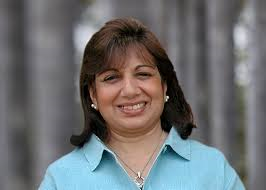Biocon launches world's first Biosimilar 'CANMAb' in India
January 18, 2014 | Saturday | News
Biocon launches world's first Biosimilar 'CANMAb' in India
Dr Kiran Mazumdar-Shaw, CMD, Biocon
CANMAb has been jointly developed by Biocon in partnership with Mylan and it is said to be the world's first biosimilar version of Herceptin.
At the launch this morning, Dr Kiran said, "We are announcing the launch of a very important product that we have developed over the years. We have branded this product as CANMAb, which is all about Convenience, Affordability and something New from India."
After 7 years of painstaking research and development, CANMAb is exclusively manufactured at Biocon's biologics facility in Bangalore and will be available for patients during the first week of February 2014.
CANMAb will be available in 150mg and 450mg quantities, priced at Rs 19,500 and Rs 57,500 per vial respectively, compared to Herceptin, which costs Rs 75,000 for 440mg.
Breast cancer is the most common cancer among women across India and the world. The incidence of breast cancer in the world is roughly about 1.6 million cases reported each year.
About 1.4 lakh cases of breast cancer are reported in India annually and 25% of then are HER2-positive.
HER2-positive is said to be aggressive and fast-growing breast cancer, which has much higher risk of early recurrence and death.
The launch saw the presence of Biocon's key management team including, Dr Arun Chandavarkar, COO; Mr Shukrit Sudhir Chimote, India head & VP, branded formulations; and Dr Abhijit Barve, president, R&D.
Dr Kiran revealed that more than 80% of the deaths due to non-communicable diseases (NCD's) occur in the developing countries and cancer is one among them.
"Most drug innovation takes place in the developed world. What is also important is that only 1 out of every 4 new molecular entities is made available in the developing markets. This is a major challenge that we face," she added.
Dr Kiran spoke about the affordability challenge that is being faced in the developing economy. She said that unlike the developing world, the developed world has a very good coverage of health requirements through national health care systems.
"Even though drugs are made available to the developing economies, it is still beyond the reach of many patients in the developing economies," opined Dr Kiran.
According to Dr Kiran, 45% of the families with one cancer patient face catastrophic expenditure in India. About 25% of the families with one cancer patient are pushed below the poverty line.
The cost of treatment for metastatic breast cancer patient in India is about Rs 20,000-30,000 per month, and it is Rs 80,000 per month for treating HER2-positive using innovator trastuzumab.
In her presentation, Dr Kiran pointed out that in Europe, a patient has to spend just about 0.5 days of his wages for the purpose of OAD treatment course, compared to south-east Asians who need to spend 1.3 days of their wages and African's up to 8.4 days of their wages.
She also presented that, in Europe a patient has to spend approximately 143 days of his or her wages to purchase a cancer metastatic treatment course; 372 days wages in south-east Asia; 1285 days wages in Latin & South America; and 2398 days' worth wages in Africa.
"A lot of middle income countries face the 5/80 cancer disequilibrium. 95% of the global spending on cancer drugs is in high-income countries. Only about 5% is spent in developing economy and yet the burden of diseases is only in the developing economy. In south-east Asia, the per capita income is roughly about $3000 and the treatment for leukemia is about $20,000. Here we can see how skewed this whole cancer treatment regime is," added Dr Kiran.
In 2010, there were about under a million cancer cases reported in India. But this may rise to 1.2 million by 2020. Today, India stands next to US and China in this regard.
In the past, cancer was treated through radiation and chemotherapies, but now it is more of using targeted therapies like biologics. "Biologics are very expensive drugs to be developed. They are complex, and in the US, biologics cost anywhere between $100,000-500,000 per year. This is absolutely unaffordable in a country like India. This made us believe to develop a drug in terms of biosimilar," explained Dr Kiran.
To develop a biosimilar, it take about 50 times the cost and 4 times the time in comparison to developing small molecule generics.
In her concluding remarks, Dr Kiran Mazumdar expressed, "We have now developed this important biosimilar. We hope to take this drug to patients who need it. We focus on making it very accessible to patients beyond just providing drugs at lower cost. We will have a special program for compassionate use at discounted schemes for the poor. We hope it will really impact patients suffering from HER-2 positive breast cancer."
The clinical trials (CANMAb Vs Herceptin) were carried in 23 centers across India for a duration of 24 weeks.
Dr Arun Chandavarkar added, "We started working on this drug before partnering with Mylan back in 2007/08. It took us a lot more time and money, and a significant investment to bring this biologic product to the market simply because it is a complex molecule that is difficult to develop, requiring elaborate clinical trials unlike small molecule generics."
So far, Biocon and Mylan has co-developed 8 molecules in partnership.









